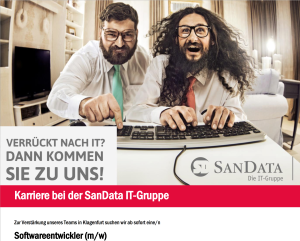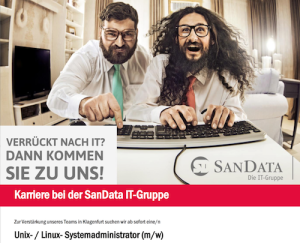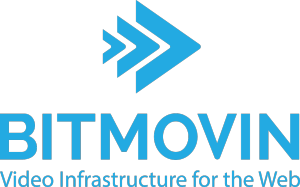24. November 2016, Lakeside, Raum L 1.014
09:00-11.00, Martin Atzmüller
Title: Data Analytics in Social and Ubiquitous Knowledge Spaces
Abstract: In the age of digital transformation, information and data is becoming ubiquitous. Social Media, Web 2.0, mobile and ubiquitous computing, as well as Industry 4.0 and smart production enable diverse options for the analysis and mining of the emerging complex knowledge spaces. The talk presents according approaches and methods for comprehensive analytics of the respective information and knowledge processes.
11:00-13:00, Patrick Delfmann
Title: Comprehensible Predictive Models for Business Processes
Abstract: Predictive modeling approaches provide a way to analyze, plan, streamline, and control the structure and behavior of business processes. For instance, they can inform decision makers about undesirable events that are likely to happen in the future, giving the decision maker an opportunity to intervene. The talk introduces a new predictive modeling technique for business processes based on probabilistic finite automatons. Fitting such a probabilistic model to a data set of past behavior makes it possible to predict how currently running process instances will behave in the future. To clarify how this technique works and to facilitate its adoption, the talk also shows a way to visualize the probabilistic models. The effectiveness of the technique is assessed via an experimental evaluation with synthetic and real-world data. Finally, the talk reports on current applications of the technique in the areas of classic business process management, corporate communication and collaboration and the Internet of Things.
14:00-16:00, Alexander Felfernig
Title: Recommendation and Decision Technologies for Complex Products and Services
Abstract: Recommendation technologies are widely used for increasing the accessibility of large item assortments – application examples thereof are online platforms such as amazon.com or netflix.com. Although already widely used in industrial environments, there are still many challenges to be tackled to further increase the applicability of these technologies. Especially when providing recommenders for complex products and services such as financial services, electronic equipment, and software artefacts, understandability and manageability issues arise with regard to the underlying knowledge bases. In scenarios where groups of users are interacting with such systems, mechanisms have to be provided that assure fairness and consensus in the underlying decision process. Furthermore, knowledge about human decision making has to be taken into account when developing recommendation systems, for example, mechanisms have to be included that are able to counteract decision biases. Finally, recommendation technologies are not only used for recommending products and services but also act as key-enabling technologies for achieving persuasive goals. This talk will focus on a discussion of solutions that help to tackle the mentioned challenges and have already shown to be useful in industry. In this context, new research results in terms of algorithms and techniques will be presented. The talk will be concluded with an overview of major issues for future research.
16:00-18:00, Sabine Graf
Title: How to make educational information systems more adaptive, intelligent and personalized?
Abstract: Information systems are prevalent in our daily lives and research showed that making such systems more adaptive, intelligent and personalized by enabling them to automatically consider users’ current situations, characteristics and preferences and providing them with actionable information can make these systems more effective and easier to use. An important domain for such information systems is education. Although research showed that education works best when it is tailored to individual people’s needs, the information systems that are widely used by educational institutions (e.g., learning management systems such as Moodle) provide very limited to no personalization, adaptivity or intelligent support. Furthermore, while these systems typically gather and store huge amounts of data about how people use these systems, even with the advancements in data mining, business intelligence and decision support systems in recent years, in the educational sector, such data are rarely used to inform and benefit users (e.g., instructors, learners, etc.). This talk will discuss how educational information systems can be enhanced to provide adaptive recommendations, intelligent support and customized information to learners, instructors and educational institutions. More concretely, the talk will focus on how to detect and retrieve a variety of useful information from raw data as well as how to present such information to users, for example, through dashboards and visualizations, or in the form of adaptive interfaces, intelligent support and personalized recommendations, using techniques from different fields such as data mining, user modelling, data/knowledge analytics, recommender systems, decision support systems, business intelligence and others. Results and findings will be discussed, showing that such enhanced information systems allow to better support users such as learners, instructors and the administration of educational institutions. In addition, future research directions will be outlined, to continue addressing some of the prevalent challenges in blended and technology enhanced education, such as increasing learner performance, improving user satisfaction and providing the right information to the right person at the right time. Furthermore, potential opportunities to apply our research to other domains such as e-commerce, business, tourism, etc. will be discussed.
25. November 2016, Lakeside, Raum L 1.014
9:00-11.00, Christian Huemer
Title: Model-Driven ERP System Development
Abstract: In the discipline of accounting, the resource-event-agent (REA) ontology is a well accepted conceptual accounting framework to analyze the economic phenomena within and across enterprises. We used REA as a basis for developing a domain specific modeling language and corresponding tool support for ERP system development. Evidently, a model-driven approach requires transforming the REA-DSL artifacts to code. Thus, we developed the transformation of the REA-DSL to a relational database for an ERP system. This approach offers the advantage that a domain expert verifies the relevant data in an „accounting language“, whereas the IT expert is able to work with traditional data base structures.
In an alternative approach, we target the adaptation of an ERP system to specific company’s needs by configuration and customization which usually is cost-intensive and requires experts with specialized know-how. Therefore, we developed a model-driven approach that configures a generic ERP system to customer needs by means of models in order to provide a less costly solution. In the so-called REAlist approach, the REA business models serve as configuration information to be interpreted at run-time by the generic, domain-agnostic ERP engine.
This talk will first introduce the REA-DSL that provides the foundation for both approaches and will afterwards highlight the REA-DSL transformation to data base structures and elaborate in detail on the REAlist architecture. In order to demonstrate the future research portfolio, the presented work is further discussed in the context of Industrie 4.0 and will highlight open research challenges for horizontal and vertical integration of ERP systems in production processes.
11:00-13.00, Dietmar Jannach
Titel: Empfehlungssysteme – Mehr als smarte Algorithmen zur Matrixvervollständigung
Kurzfassung: Automatisierte Empfehlungen und Personalisierung sind heutzutage ein allgegenwärtiger Bestandteil unserer Nutzererfahrung sowohl im World Wide Web als auch in mobilen Apps. In der Informatikforschung wurden in diesem Umfeld in den letzten Jahren enorme Fortschritte gemacht. Die Aufgabe der entwickelten Algorithmen ist es zumeist, möglichst exakt vorherzusagen, wie relevant ein Produkt, ein Service oder allgemein ein Objekt für den einzelnen Benutzer ist. Das Empfehlungsproblem wird in diesen Arbeiten oft als Problem der Vervollständigung einer dünn besetzten Matrix aus Benutzern und Objekten betrachtet. In diesem Vortrag wird anhand aktueller Forschungsergebnisse darauf eingegangen, warum Algorithmen mit einer hohen Vorhersagegenauigkeit auf Vergangenheitsdaten nicht unbedingt diejenigen sind, die zu den nützlichsten Empfehlungen für die Benutzer in der Praxis führen. Ausgehend von diesen Erkenntnissen wird ein konzeptueller Rahmen vorgeschlagen, der von einer algorithmenorientierten Vorgehensweise zu einem interdisziplinären ziel- und nutzenorientierten Forschungsansatz führt.
14:00-16:00, Agnes Koschmider
Titel: Vorrausschauende Analysen für smarte Umgebungen
Kurzfassung: Trotz der heute zu beobachtenden Verbreitung von Sensoren in unterschiedlichsten Geräten und Umgebungen, die Daten für individuelle Objekte (Auto, Person, etc.) mit personenbezogenen Verhaltensprofilen sammeln, existieren zur Prädiktion individuellen Verhaltens überraschend wenige wissenschaftliche Ergebnisse und praktische Ansätze. Dabei hätten Anwendungen solcher Verfahren potentiell einen hohen wirtschaftlichen als auch sozialen Mehrwert. Denkt man beispielsweise an Smart Home Umgebungen zur Unterstützung der Heimpflege älterer Menschen, ließen sich z.B. individuelle Wahrscheinlichkeiten zum Wechsel in eine andere Pflegestufe innerhalb einer gewissen Zeit prognostizieren. Im Kontext von Connected Cars könnten durch Auswertung menschlichen Verhaltens individuelle Gefahrensituationen prognostiziert werden, die den Eingriff des Fahrers ins System erfordern. Existierende Forschungsarbeiten im Bereich prädiktive Verhaltensanalyse beschränken sich weitgehend auf strukturierte Prozesse, bei denen die Reihenfolge einzelner Aktivitäten vordefiniert ist und sich alle individuellen Objekte nach dem gleichen Prozessschema richten. Diese Vorbedingungen des strukturierten menschlichen Verhaltens trifft in smarten Umgebungen, bei denen Daten aus Sensoren gesammelt werden (wie Smart Home oder Connected Cars) nicht zu, hier sprechen wir von unstrukturierten Entscheidungsfindungsprozessen.
16:00-18:00, Thomas Setzer
Title: Robust Integration of Judgmental and Statistical Predictions in Forecasting Support Systems
Abstract: The accuracy of forecasting plays a pivotal role in enterprise decision making as forecasts usually form part of an IS on which business functions, such as marketing or resource planning depend. Today, forecasts are typically derived by expert judgment supported by model-based predictions that are provided within forecasting support systems (FSS). There is, however, evidence that this integration is often carried out poorly and the resulting predictions are regularly biased. In this talk, I propose an alternative forecast generation process that – in the spirit of crowd wisdom and forecast blending – combines individual model-based and judgmental forecasts ex-post to derive less biased and more robust predictions. The core of the combination method is the analytical derivation of the previously unknown bias–variance decomposition of a combination’s mean squared error (MSE). In our recent work we could derive this decomposition for an important class of linear combinations (weighting schemes) of individual forecasts, which allows for determining the weighting scheme with minimum expected MSE. Empirical results will be presented that show significantly lower MSE when applying the approach compared the judgmental forecasts or commonly used weighting schemes. The outlook of the talk will discuss a novel kind of debiasing support system. The system is aimed at a cognitive engineering of experts (to reduce bias over time) and avoiding high-impact errors introduced by adjusting originally sound judgmental expectations through the combination. Based on an expert’s error history, the system provides information on the bias suggested to drive the difference and prompts him/her for action and explanation in case of strong deviation between the combined forecast and his/her expectation.
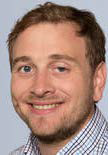 Bernhard Dieber ist seit 2015 am Institut für Robotik und Mechatronik der JOANNEUM RESEARCH Forschungsgesellschaft mbH beschäftigt und leitet seit Juli 2016 die neu gegründete Forschungsgruppe „Robotik Systeme“. Bernhard Dieber verfügt über eine mehr als 10 jährige Erfahrung in den Bereichen Software Engineering, Sensor Networks und Smart Cameras. Die Forschungsinteressen von Dr. Dieber umfassen Software- und Systems-Engineering für robotische Systeme, Systemsicherheit und Sicherheits-Architekturen in Produktionssystemen und die Zuverlässigkeit von Robotersystemen. Arbeiten zu Themenstellungen in Bezug auf eingebettete, verteilte und Echtzeit-Systeme sowie Software-Qualität robotischer Software runden seine wissenschaftliche Tätigkeit anwendungsorientiert ab.
Bernhard Dieber ist seit 2015 am Institut für Robotik und Mechatronik der JOANNEUM RESEARCH Forschungsgesellschaft mbH beschäftigt und leitet seit Juli 2016 die neu gegründete Forschungsgruppe „Robotik Systeme“. Bernhard Dieber verfügt über eine mehr als 10 jährige Erfahrung in den Bereichen Software Engineering, Sensor Networks und Smart Cameras. Die Forschungsinteressen von Dr. Dieber umfassen Software- und Systems-Engineering für robotische Systeme, Systemsicherheit und Sicherheits-Architekturen in Produktionssystemen und die Zuverlässigkeit von Robotersystemen. Arbeiten zu Themenstellungen in Bezug auf eingebettete, verteilte und Echtzeit-Systeme sowie Software-Qualität robotischer Software runden seine wissenschaftliche Tätigkeit anwendungsorientiert ab.
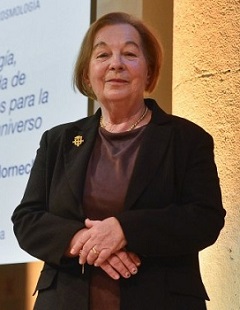
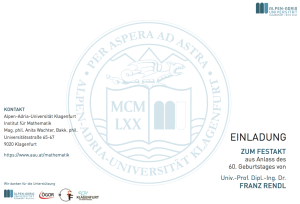
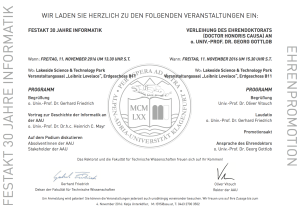
 SANER is the premier research conference on the theory and practice of recovering information from existing software and systems. It explores innovative methods of extracting the many kinds of information that can be recovered from software, software engineering documents, and systems artifacts, and examines innovative ways of using this information in system renovation and program understanding. After Antwerp (2014), Montreal (2015), Osaka (2016), SANER 2017 will be held in Klagenfurt am Wörthersee, Austria on February 20-24th, 2017.
SANER is the premier research conference on the theory and practice of recovering information from existing software and systems. It explores innovative methods of extracting the many kinds of information that can be recovered from software, software engineering documents, and systems artifacts, and examines innovative ways of using this information in system renovation and program understanding. After Antwerp (2014), Montreal (2015), Osaka (2016), SANER 2017 will be held in Klagenfurt am Wörthersee, Austria on February 20-24th, 2017.